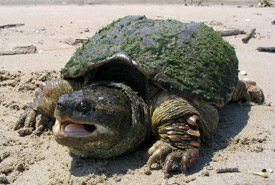10 tweetable facts about turtles

Snapping turtle (Photo by Ryan M. Bolton)
World Turtle Day, May 23, is an annual occasion that American Tortoise Rescue began 17 years ago to honour and promote turtle and tortoise conservation around the world.
Sadly, global turtle and tortoise populations are declining because of smuggling, climate change, habitat destruction, the exotic food industry and the pet trade. To date, the Nature Conservancy of Canada (NCC) has protected habitat for eight at-risk turtle species.
In honour of World Turtle Day, here are 10 tweetable facts about turtles:
1. Turtle shells have nerves and a blood supply, making them an active part of the turtle's body. (Tweet this!)
2. The eastern snapping turtle, Canada’s largest freshwater turtle, stays underwater for so long that algae grows on its shell. (Tweet this!)
3. When threatened, the eastern musk turtle, a.k.a. “stinkpot turtles,” releases a skunk-like odour. (Tweet this!)
4. Leatherback turtles, the largest turtle species in the world, can weigh up to 680 kilograms. (Tweet this!)
5. A turtle’s shell is an altered ribcage that’s part of its vertebral column and consists of 50 different bones. (Tweet this!)
6. When female sea turtles are ready to lay their eggs, they travel back to the same beach where they were born. (Tweet this!)
7. Turtles inhabit all continents except Antarctica. (Tweet this!)
8. Nest temperature affects which sex sea turtles are born as, with temperatures above 29 Celsius resulting in more female offspring. (Tweet this!)
9. The oldest discovered turtle fossil dates from around 220 million years ago. (Tweet this!)
10. The longest-lived turtle recorded was 188 years old. (Tweet this!)
To learn more about Canada’s turtle species, click here.


